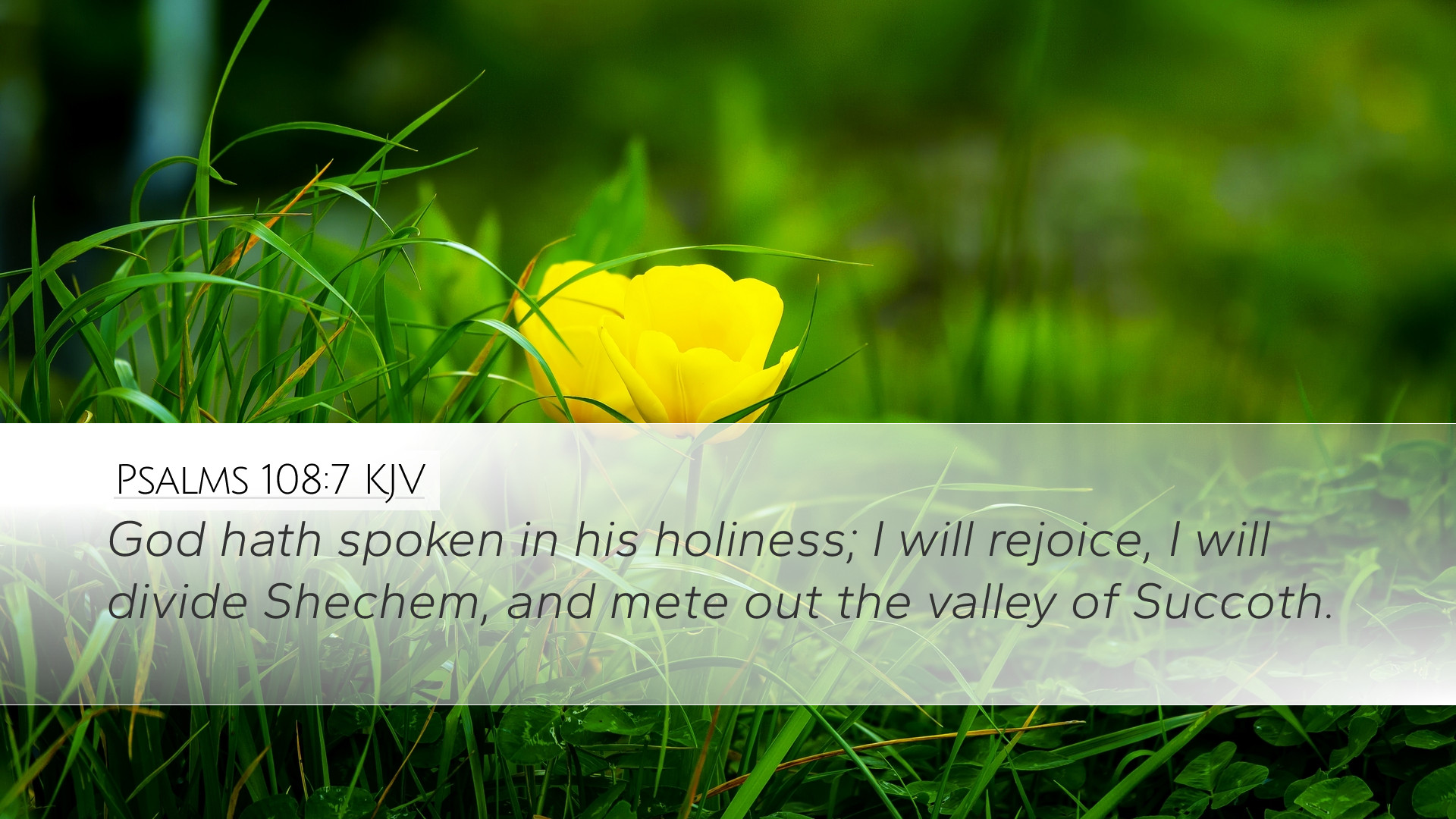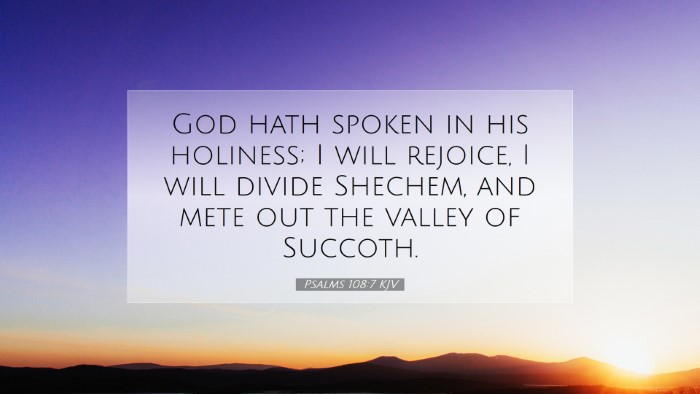Psalms 108:7 Commentary
Verse: "God has spoken in his holiness; I will rejoice, I will divide Shechem, and mete out the valley of Succoth." (Psalms 108:7, KJV)
Introduction
The Psalms are rich in emotional expression and theological depth. Psalm 108 is attributed to David and is a beautiful synthesis of praise and petition. In particular, verse 7 serves as a pivotal turning point where divine revelation and human response intersect. This commentary will explore the insights from various public domain sources regarding this verse, unpacking its implications for contemporary readers.
Divine Communication
God Has Spoken: The psalmist begins with the proclamation that “God has spoken in his holiness.” This indicates the certainty and authority of God's word. Matthew Henry states that God’s holiness is not merely a characteristic but the foundation for His promises and commands. When God speaks in His holiness, it guarantees that His words are pure, trustworthy, and aligned with His nature.
Albert Barnes elaborates on this point by emphasizing that the holiness of God implies His separation from sin and His distinct moral perfection. Thus, when God communicates, it is inherently good, shedding light on His righteous expectations from His people.
The Call to Rejoice
The psalmist declares, "I will rejoice." This expression reflects not merely an emotional response but a cognitive choice to celebrate God's promises. Adam Clarke notes that rejoicing is an act of faith—it recognizes God’s authority and faithfulness, despite present circumstances. The psalmist's resolve to rejoice underscores the importance of maintaining spiritual joy as a response to divine assurance.
Furthermore, this rejoicing is both personal and communal, suggesting that individual experiences of joy can inspire a collective celebration of God’s goodness among His people.
Dividing Shechem and Meteing Out Succoth
Dividing Shechem: The mention of Shechem refers to a significant city in Israel’s history, representing a strategic geographical and spiritual location. Henry suggests that the act of dividing Shechem indicates God's sovereignty over the land and its people. This act can symbolize the unfolding of God's plan for His people and their inheritance.
Mete Out the Valley of Succoth: The valley of Succoth holds historical importance, as it was associated with the Israelites' journey through the wilderness. Clarke points out that “mete out” implies measuring or determining boundaries, which reflects God's authority to allocate land and resources according to His wisdom. This action reaffirms God’s providential care over His people during their pilgrimages and trials.
Theological Implications
The implications of this verse extend beyond historical context and into theological significance. The certainty of God’s spoken word with its intended fulfillment can inspire confidence in believers today. Barnes notes that such assurance encourages believers to trust in God's sovereignty and divine will, providing a basis for hope amidst uncertainty.
Moreover, the communal dimensions of the declarations in this verse remind the church that there is power in collective faith and action. As the psalmist models a joyful response to God’s revelations, congregations can learn to rejoice together in God's promises.
Application for Pastors and Theologians
For pastors, this verse serves as a call to inspire congregational joy based on the conviction of God’s promises. Engaging a community in rejoicing for what God has proclaimed can foster deeper spiritual relationships and growth.
Theologians might delve into the intricacies of divine holiness and human response, examining how understanding God's character reshapes our worship and response. It challenges scholars to explore the nature of God’s revelation through scripture, particularly in how holiness contextualizes His covenant with humanity.
Conclusion
Psalms 108:7 exemplifies a rich tapestry of divine action, human response, and the overarching themes of joy and holiness. By reflecting upon these insights from Henry, Barnes, and Clarke, we discover that the words spoken by God resonate with timeless truths about His nature and our identity as His people. The call to rejoice, grounded in divine assurance, remains ever relevant for believers as they navigate the complexities of life, standing firm in faith as they await the fulfillment of God's promises.


